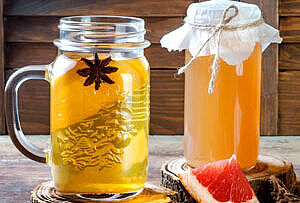17. October 2020
Beverage Trends in Australia & New Zealand
Natural, healthy and low alcohol drinks are popular in Australia and New Zealand
Across the range and across the world, the soft drinks, energy drinks, sports drinks or RTD coffee drinks beverage market has been showing consistent growth. This trend is expected to continue in the coming years, which means that the industry will be challenged to pick up on current and emerging trends and respond quickly to consumer wishes. As well as new and innovative flavours, consumers worldwide are increasingly looking for more healthy, reduced sugar and plant-based variants of their favourite drinks.
In Australia and New Zealand, naturalness, health and plant-based nutrition are among the biggest trends in beverages. Kombucha, a modern and natural fermented tea drink, has emerged as a particular new favourite. The trend towards beverages based on fermented tea has gained high consumer acceptance not only because of its taste, but also for its versatile health benefits. Kombucha is claimed to contribute positively to detoxification of the body and to strengthening the immune system and improving joint health. With an estimated turnover of US$129.7 million,1 production of kombucha is one of the most booming industries in Australia.
Kombucha as a major winner
Mostly produced from sweetened black or green tea, kombucha is promoted as a drink that provides consumers a completely new taste experience, with a low calorie content. The essential element is “SCOBY” (Symbiotic Colony of Bacteria and Yeast), also known as “kombucha culture”. It contains various bacteria and yeasts that help to ferment the tea, resulting in a soft drink with slightly vinegary taste profile and containing some alcohol; usually below 0.5 per cent. As the sugar content of the beverage is significantly reduced during the fermentation process, kombucha aligns with the continually growing demand for refreshing, reduced sugar beverages associated with a healthy lifestyle.
Döhler supplies its customers with natural ingredients required for the production of kombucha from a single source and with a kombucha base that allows customers to formulate individual recipes without needing to ferment. The kombucha base is available in conventional and in organic quality.
While it is originally from China, this novel drink has now found its way onto supermarket shelves around the world and it has quickly become one of the most important drinks of the beverage scene in Australia. In 2019, the second-highest number of new kombucha product launches in the world were made there; only the USA had more.2
Plant-based diet on the rise
Around 10% of Australia’s population of just under 25 million – an estimated 2.5 million people – consume plant-based food only.3 The beverage industry is adapting to the changing preferences and habits of consumers and increasingly providing plant-based products that create a unique taste experience.
Döhler provides individual taste solutions for a variety of beverages such as plant-based drinks with the ingredients derived from sustainable sources of high-quality raw materials. The portfolio ranges from solutions based on almonds to rice, or oats to coconut. The mild taste of oat drinks make them, especially, very popular among consumers and distinguishes them from drinks such as those made from almonds or coconut, whose taste is rather sweet. Furthermore, oats contain important minerals such as potassium and magnesium, essential for building muscles and nerve cells. Alongside the increasing demand for plant-based foods and beverages, plant-based variations of traditional dairy products are also becoming popular.
An increasing number of consumers around the world would like to avoid alcohol, according to a study conducted by Doehler Sensory & Consumer Science. Nearly half of those consumers surveyed – 48% - stated a preference for non-alcoholic beverages over wine or beer, cocktails and long drinks.4 However, they are still interested in beverages with a convincing “adult” sensory taste profile. Hence, the taste, smell, consistency, mouthfeel and colour of non-alcoholic variants should hardly differ from alcoholic originals and should offer equivalent taste experiences.
Non-alcoholic beers are now among the top market drivers in the beer category. While the consumption of alcoholic beers is only slightly increasing worldwide, non-alcoholic versions are gaining market share. This trend is clearly evident in Australia and New Zealand. The demand for non-alcoholic variants is also steadily increasing in the spirits sector; worldwide, non-alcoholic spirits are expected to grow at an annual rate of 7.5 per cent by 2024.5
In addition to low alcohol, more and more consumers are also paying attention to drinks’ sugar content. In the case of spirits, consumers in Australia and New Zealand are increasingly focusing on sugar-free or reduced-sugar variants of products such as gin or vodka.
Comprehensive portfolio for outstanding taste
As well as its portfolio of natural and authentic flavour extracts, Doehler also offers distillates of single plant substances for the traditional production of gin, as well as distillates from botanical mixtures. All distillates are “From the Named Source” (FTNS) and are produced by traditional batch distillation. Extracts or distillates such as ginger and hibiscus or herbal and tea infusions such as chamomile and hemp or green tea lead to individual flavours for distinctive non-alcoholic spirits.




